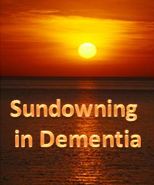 Do you provide senior care for someone with dementia, who gets restless in the late afternoon?
Do you provide senior care for someone with dementia, who gets restless in the late afternoon?
Do you work at a senior care facility and experience the increased wandering and agitation of residents during the evening hours?
Have you noticed your loved one with dementia experiencing changed sleeping patterns and more difficulty late in the day?
Most likely you are experiencing the set of symptoms termed Sundowners Syndrome or sundowning behavior in dementia. For a variety of reasons (from our bodies’ natural rhythms and light signals to learned patterns), persons with dementia may have particular difficulty in the late afternoon and evening hours. The person often feels a sense of restlesness and agitation–a need to go somewhere or do something, the sense of being unsettled. This may manifest itself as a need “to go home” and lead to wandering or may show up in a variety of behaviors.
Senior care providers should be aware of this set of symptoms and watch for such patterns. A care facility may want to staff this time of day differently or plan for specific activities and try to manage the environment. Some examples include changes to lighting, providing distracting and/or calming activities during this time, ensuring residents have a snack and are well-rested and reducing irritating stimuli. More one-on-one attention may be needed for safety and reassurance during late afternoons and evenings.
Senior caregivers caring for a loved one or client at home should also monitor for different behaviors and patterns. What are some things you can do to better manage sundowners syndrome and provide safe, dignified dementia care?
- Learn the patterns of the person you are caring for and monitor for significant changes. You can anticipate concerns, plan activities and structure care accordingly. If you notice a significant behavior change, talk to your loved one’s medical professional as it may indicate an underlying cause (for example, infections often cause agitation or a spike in confusion in someone with dementia).
- Attend to basic needs/comforts. Is the person hungry? Cold? In comfortable clothes? Does the person need to go to the bathroom?
- Get sufficient rest and prepare yourself as a caregiver. If the afternoons and evenings become increasingly tiring, consider using respite care to help. Dementia care recipients can sense your attitude, exhaustion and often reflect that back to you–creating a negative cycle when you are burnt out.
- Take a team approach to dementia care. Find ways to create a care team before you are exhausted. Can someone help you with errands or chores? Can you bring in some outside help before you get in to a crisis, to have time to introduce the caregiver to your loved one and gain a comfort level? How can family, friends or home health caregivers help relieve you so that you can manage the challenges of sundowning better?
- Express empathy with the person’s feelings…and then try to redirect/provide an outlet for anxieties. Understand that while the person may be expressing a need to “go home” when they already are home or a need to complete some imaginary task, they are really expressing a feeling of restlessness. You may find that certain activities help relieve the anxiety, such as keeping busy with tasks or listening to calming music.
- Talk to your loved one’s medical providers about your concerns. Medication changes may help (sometimes even changing timing of current medications may be beneficial). Light therapy has proven beneficial for some people, and regulating the sleep cycle/patterns can certainly help (trying to eliminate naps, keep the person busy/exercise during the day, etc.).
When you are seeking help with senior care, it is vital to understand the experience and training of potential caregivers to deal with Alzheimer’s care and Sundowners Syndrome. When interviewing home health agencies for home caregivers, find out about the training and support provided. Ask about the care planning process. Find out about the agency’s team approach to ensuring your loved one has familiar caregivers who know his/her routine and needs. To learn more about EasyLiving’s approach to Alzheimer’s care, you can check out our Alzheimer’s Specialty Care page and contact us today for answers to your questions or to schedule a free home assessment at 727-447-5845.
Need more tips on managing Alzheimer’s care and Sundowners Syndrome? Want specific ideas on handling wandering or agitation? Get the “go to” dementia care resource today: download the free memory care guide.







